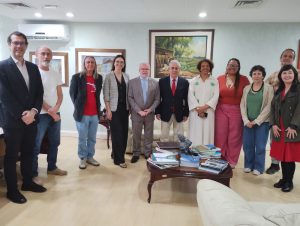UFSC Graduate Studies Council approves resolution establishing credit equivalence with the European ECTS system
The Graduate Studies Council (CPG) of UFSC approved the Normative Resolution that regulates the equivalence and conversion of credits between the University’s graduate system and the European Credit Transfer and Accumulation System (ECTS), an important milestone for advancing academic internationalization at UFSC.
The proposal, presented by the Office of International Relations (SINTER) in the Official Letter No. 40/2025/SINTER, was analyzed and approved by the CPG on 3 December 2025, with a favorable opinion from the rapporteur.
The technical drafting of the resolution was carried out by SINTER staff members – most notably Bruno Wanderley Farias, from the Information Management Division – and also involved the participation of the Prorectorate for Graduate Studies (PROPG). The collective effort included regulatory analysis, alignment with international best practices, and coordination among administrative and academic units.
According to the explanatory memorandum submitted by SINTER, the regulation fills a longstanding gap. Although UFSC maintains strong ties European institutions — which account for more than 40% of academic mobility and approximately 39% of the University’s joint international scientific production — there was no specific regulation governing the conversion and formal recognition of credits between the two systems. This lack of a regulatory framework hindered cooperation agreements, double-degree programs, co-supervision, and the transfer of credits for students participating in mobility programs.
















